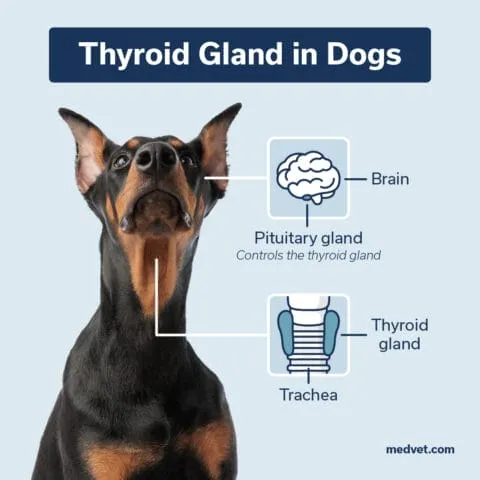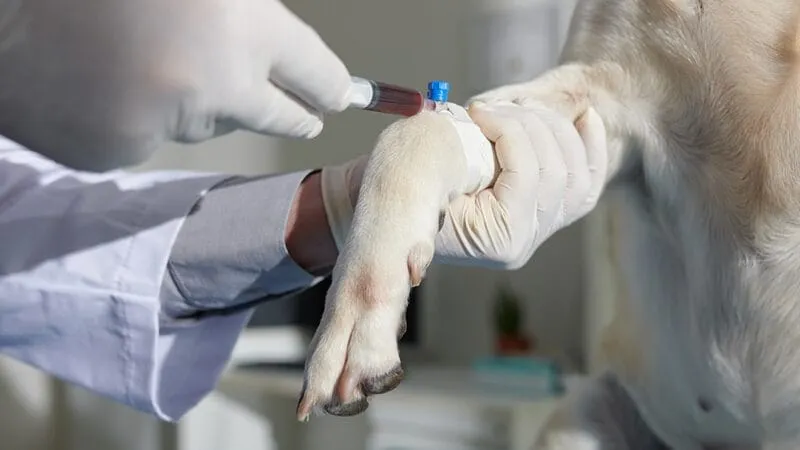The thyroid gland is a vital organ, playing a critical role in regulating metabolism, growth, and overall development. In dogs, thyroid disorders are a prevalent health concern. A comprehensive understanding of how the thyroid functions, recognizing the signs of potential thyroid issues in your canine companion, the diagnostic process, and available treatment options are crucial for effectively managing your dog’s well-being. This guide delves into “Dogs And Thyroid Problems,” specifically focusing on hypothyroidism.
What is the Thyroid Gland?
The thyroid gland is situated in the neck, adjacent to the trachea (windpipe), comprising two lobes, one on each side. This gland is under the control of the pituitary gland, located at the base of the brain. The thyroid continuously releases hormones into the bloodstream, essentially acting as the body’s “furnace,” dictating the pace of various bodily functions, including metabolism – how efficiently cells utilize energy. The primary hormones produced are thyroxine (T4) and triiodothyronine (T3).
When a dog’s thyroid gland malfunctions, it can disrupt this delicate balance. Hypothyroidism is one of the most common thyroid disorders in dogs. This condition arises when the thyroid gland fails to produce sufficient thyroid hormone, leading to a significant slowdown in the dog’s metabolic rate. It’s possible for thyroid disorders to develop subtly, and by the time a diagnosis is made, a dog might have lost as much as 75% of its thyroid tissue.
 Illustration of a dog's thyroid gland
Illustration of a dog's thyroid gland
Recognizing the Signs of Canine Hypothyroidism
The symptoms of hypothyroidism in dogs can be varied and sometimes inconspicuous, making diagnosis a challenge based on clinical signs alone. Key indicators to watch for include:
- Weight Gain: Affected dogs may experience weight gain without any increase in food intake or calorie consumption.
- Lethargy and Decreased Activity: A noticeable decline in energy levels is common, with dogs appearing unusually tired or sluggish.
- Skin and Coat Issues: Hypothyroid dogs frequently suffer from skin problems, such as dryness, flakiness, darkening of the skin, and recurrent infections. Their coat quality may deteriorate, leading to hair loss, particularly around the flanks, thighs, neck, and tail. Hair regrowth after clipping may also be slow or non-existent.
- Intolerance to Cold: Dogs with hypothyroidism often seek out warm environments and exhibit a reduced tolerance for colder temperatures.
- Reproductive Disturbances: Females might experience irregular heat cycles, while males may exhibit a decreased libido.
- Other Symptoms: Less frequently observed signs can include anemia (low red blood cell count), elevated blood cholesterol levels, neurological issues, and a slower heart rate.
If you notice any of these symptoms, it’s essential to consult your veterinarian. Early detection is key in managing “dogs and thyroid problems.”
Causes of Canine Hypothyroidism
The exact cause of canine hypothyroidism is not always identifiable. It can stem from lymphocytic thyroiditis, an autoimmune condition where the dog’s own immune system mistakenly attacks the thyroid gland. Over time, this autoimmune assault can damage enough thyroid tissue to result in hypothyroidism.
Idiopathic thyroid gland atrophy is another cause, characterized by the degeneration and replacement of thyroid tissue with fat. However, the underlying reasons for this process remain poorly understood.
Hypothyroidism is more prevalent in medium to large breed dogs, typically affecting middle-aged canines between four and ten years old. While any dog can develop the condition, certain breeds are genetically more predisposed, including Beagles, Borzois, Boxers, Cocker Spaniels, Doberman Pinschers, Giant Schnauzers, Golden Retrievers, Irish Setters, and Rhodesian Ridgebacks, among others. Understanding breed predispositions can be helpful when considering “dogs and thyroid problems.”
Diagnosing Canine Hypothyroidism
The diagnosis of hypothyroidism generally involves a comprehensive approach combining clinical assessment with diagnostic testing. Your veterinarian will begin with a thorough review of your dog’s medical history and a complete physical examination. Blood tests are indispensable for evaluating your dog’s hormone levels. The most common tests include:
- Total T4 (TT4): This serves as a primary screening test for hypothyroidism, though its accuracy can be influenced by other factors like illness or medications.
- Free T4 (FT4) by Equilibrium Dialysis: This test measures the unbound T4 levels, which are less susceptible to fluctuations caused by non-thyroidal illnesses.
- Thyroid-Stimulating Hormone (TSH) Assay: This test quantifies the level of TSH. In cases of hypothyroidism, TSH levels are typically elevated as the pituitary gland attempts to stimulate the underactive thyroid to produce more hormones.
- T3 and T4 Autoantibody Tests: These tests help identify autoimmune thyroiditis by detecting the presence of antibodies against thyroid hormones.
A T4 level is often included in routine blood panels, making it relatively straightforward for your veterinarian to identify if your dog’s thyroid level is low. However, due to the potential impact of illness and medications on T4 levels, additional tests are frequently required to confirm a hypothyroidism diagnosis. This careful diagnostic process is vital for addressing “dogs and thyroid problems.”
Treating Canine Hypothyroidism
The primary treatment for hypothyroidism in dogs is hormone replacement therapy. The most commonly prescribed medication is FDA-approved levothyroxine, a synthetic form of thyroxine administered orally. The appropriate dosage and frequency are determined by the severity of the condition and the individual dog’s response to treatment. This therapy is typically lifelong and necessitates regular monitoring, including periodic blood tests, to ensure optimal hormone levels are maintained.
 A dog receiving medication for hypothyroidism
A dog receiving medication for hypothyroidism
Prognosis for Dogs with Hypothyroidism
The outlook for dogs diagnosed with hypothyroidism is generally very positive. With appropriate and consistent treatment, most dogs experience a significant improvement in their symptoms and can lead normal, fulfilling lives. Regular follow-up visits with your veterinarian are essential for adjusting medication dosages and monitoring your dog’s overall health.
While hypothyroidism cannot be cured, it is highly manageable. Early detection and prompt treatment are paramount to effectively managing this condition, ensuring that affected dogs maintain a high quality of life. Should you suspect your dog may be suffering from hypothyroidism, it is imperative to seek a veterinary evaluation. Your veterinarian might recommend a referral to a veterinary specialist in internal medicine for a more in-depth assessment and to discuss the most effective management strategies for their health. Understanding and managing “dogs and thyroid problems” can greatly enhance their well-being.
Visit our Pet Care Resources library for more essential pet health and safety information.
